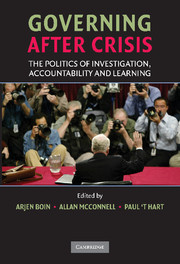11 - Conclusions: the politics of crisis exploitation
Published online by Cambridge University Press: 04 June 2010
Summary
Crisis aftermaths as framing contests
Crises cast shadows on the polities in which they occur. The sense of threat and uncertainty that pervades them shatters people's understanding of the world around them. Scholars have argued that the very occurrence of a crisis or the widespread use of the ‘crisis’ label to denote a particular state of affairs or development implies a ‘dislocation’ of hitherto dominant social, political or administrative discourses (Wagner-Pacifici 1986, 1994; Howarth et al. 2000). This dislocation can delegitimise the power and authority relationships that these discourses underpin, and may pose grave challenges to the position of incumbent officeholders and institutions or to established policies and organisations. At the same time, crisis opens up semantic and political space for actors to redefine issues, propose new policies, foster public reflection, or simply to gain popularity and strike at opponents. Typically, such opportunism rides on the wave of crisis-induced processes of accountability and learning.
Edelman was right in pointing out that incumbent elites are not necessarily threatened by crises. Some disturbances or emergencies may fit their purposes quite neatly. They may actively seek to ‘create’ crises in order to gain authority. He observes with characteristic succinctness: ‘Any regime that prides itself on crisis management is sure to find crises to manage’ (Edelman 1977: 47). But the same goes for the other end of the political power spectrum: parliamentary opposition figures, interest group leaders and self-appointed public voices may actively work to ‘discover’ and inflate crises.
- Type
- Chapter
- Information
- Governing after CrisisThe Politics of Investigation, Accountability and Learning, pp. 285 - 316Publisher: Cambridge University PressPrint publication year: 2008
References
- 12
- Cited by

